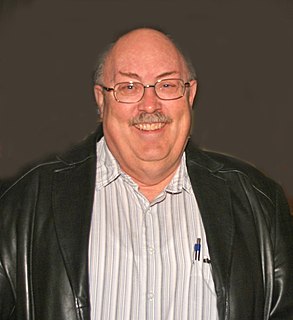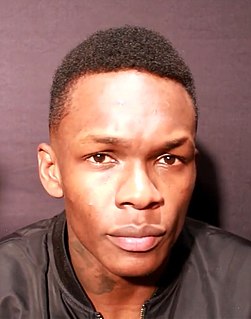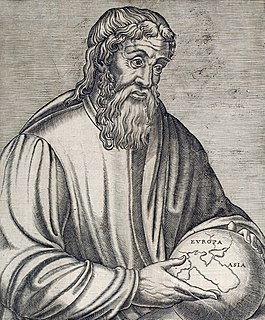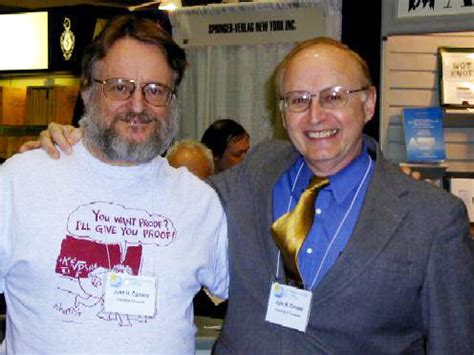Top 151 Classify Quotes & Sayings - Page 3
Explore popular Classify quotes.
Last updated on April 19, 2025.
Professionalism merges the individual into patterns of total environment. Amateurism seeks the development of the total awareness of the individual and the critical awareness of the groundrules of society. The amateur can afford to lose. The professional tends to classify and specialise, to accept uncritically the groundrules of the environment. The groundrules provided by the mass response of his colleagues serve as a pervasive environment of which he is contentedly unaware. The 'expert' is the man who stays put.
I'm not sure I'd classify any topics as off-limits, but I don't look for new territories to offend. There's my joke about when my roommate beat cancer. People talk about cancer survivors like they're warriors, but from where I was sitting, she was just watching television and eating soup. Like, did she go to war? No. She kind of just sat around.
Words can enhance experience, but they can also take so much away. We see an insect and at once we abstract certain characteristics and classify it - a fly. And in that very cognitive exercise, part of the wonder is gone. Once we have labeled the things around us we do not bother to look at them so carefully. Words are part of our rational selves, and to abandon them for a while is to give freer reign to our intuitive selves.
Catastrophe Theory is-quite likely-the first coherent attempt (since Aristotelian logic) to give a theory on analogy. When narrow-minded scientists object to Catastrophe Theory that it gives no more than analogies, or metaphors, they do not realise that they are stating the proper aim of Catastrophe Theory, which is to classify all possible types of analogous situations.
Half the people in the world think that the metaphors of their religious traditions, for example, are facts. And the other half contends that they are not facts at all. As a result we have people who consider themselves believers because they accept metaphors as facts, and we have others who classify themselves as atheists because they think religious metaphors are lies.
As I've grown as an artist, I've learned that my mission statement is really self-expression. I don't want anybody to classify my music. I want them to say, "This is somebody who's recognizing his true feelings, his true emotions, ideas, thoughts, opinions, and views on the world, all on one record." I want people to recognize that and to take it and apply it to their own lives. You know what I'm saying? The more and more I get out and talk to different people, I realize they appreciate that - me being unapologetic in whatever views and approach I have.
By instructing students how to learn, unlearn and relearn, a powerful new dimension can be added to education. Psychologist Herbert Gerjuoy of the Human Resources Research Organization phrases it simply: 'The new education must teach the individual how to classify and reclassify information, how to evaluate its veracity, how to change categories when necessary, how to move from the concrete to the abstract and back, how to look at problems from a new direction — how to teach himself. Tomorrow's illiterate will not be the man who can't read; he will be the man who has not learned how to learn.'
We definitely classify things in order to get closer to what we believe in - so it serves a purpose to really think about one style of music, and to understand the shades of delineation between similar artists. But yeah, it's really nice to listen to something the way most people listen to music! Just to enjoy it, without having to put it in context.
Horses in the Book of Mormon would be another. You have relatively few mentions of horses, but there are some, and we don't know exactly how they were used; they don't seem to be all that common. Were they horses as we understood them, [or] does the term describe some other animal? Languages don't always and cultures don't always classify things the way we would expect. We have what we call common-sense ways of doing it. They're not common sense; they're just ours. But again, we don't have a strong case there. We're just problem solving there.
Not every woman is obsessed with shoes. But every woman is more obsessed with shoes than her husband is (although that's not too difficult to accomplish, since your husband has exactly two pairs--black shoes that are ten years old and barely broken in and sneakers that are so dirty they classify as a biohazard).
Kelvin Gastelum, there's many ways I can classify his style. I like it. He's improved. One thing I can say is that he's improved over his run in the UFC from 'The Ultimate Fighter' and now being a contender. But his style? It's very Mexican. You have the Mexican style of boxing, and he has a Mexican style of MMA, like smart Mexican style.
You've probably heard the term, 'red flag warning.' That means there are extreme conditions. Low humidity, high temperatures. The fuels are extremely dry and volatile. We classify those in East Tennessee as 'fire days' so if your fire class day is a 1, it's relatively low. A class 5 day would be an extremely high danger day. A day like Sunday would be a 4 or a 5.
Aw, no. You’re taking us to that vegetarian place, aren’t you? It’s a coffee place. You can’t just automatically classify anything that isn’t a steak house as vegetarian. Yes, I can. This is America. You said Americans assert their own opinions as if they were facts and dismiss inconvenient facts as mere opinions.
I think in general, people look at all Olympic athletes, look at all superstar athletes, and they say, "Okay, this guy doesn't have any insecurities." They're almost like these icons who - I don't know how to say it, but like they can't make mistakes. But the reality is, and I'll tell you this firsthand, a lot of great athletes have a lot of insecurities, and they have a really hard time dealing with a lot of so-called losing or however you want to classify it.
What sense would it make to classify a man as handicapped because he is in a wheelchair today, if he is expected to be walking again in a month, and competing in track meets before the year is out? Yet Americans are generally given 'class' labels on the basis of their transient location in the income stream. If most Americans do not stay in the same broad income bracket for even a decade, their repeatedly changing 'class' makes class itself a nebulous concept. Yet the intelligentsia are habituated, if not addicted, to seeing the world in class terms.
Rousseau had it backwards. We are NOT born free. We are born in the chains of the random and the reflexive, and are ignorant and unreasonable by simple nature. We must learn to be free, to organize the random and detect the reflexive, to acquire the knowledge of particulars and the powers of reason. The examined life is impossible if we cannot examine, order, classify, define, distinguish, always in minute particulars.
We develop all our sciences, archeology, cosmology, psychology, we tabulate and classify and cling to our sacred definitions, our divisions, without any attempt to synthesis, without the humility to see that these are only parts of a total knowledge. ... But somehow we ought to be able to keep the idea of the totality of experience and knowledge at the back of our minds even though the front's busy from morning til night with the life cycle of the liver fluke.
At first critics classified authors as Ancients, that is to say, Greek and Latin authors, and Moderns, that is to say, every post-Classical Author. Then they classified them by eras, the Augustans, the Victorians, etc., and now they classify them by decades, the writers of the '30's, '40's, etc. Very soon, it seems, they will be labeling authors, like automobiles, by the year.
The great philosophers of the 17th and 18th centuries did not think that epistemological questions floated free of questions about how the mind works. Those philosophers took a stand on all sorts of questions which nowadays we would classify as questions of psychology, and their views about psychological questions shaped their views about epistemology, as well they should have.
The natural environment is not particularly hospitable to human life ... the key to having a good environment is improving it through work... . Energy is fundamentally an environmental improver and if we classify it that way it makes sense out of a lot of these controversies... . It's our obligation and our right to make [our environment] as good for human beings as possible. With that view, it's very easy for people to understand precisely the reason it's good to alter it - because it doesn't naturally come the way we need it to be.
In the first stage of insight-building, all that researchers can do is observe phenomena. Second, they classify the phenomena in a way that helps them simplify the apparent complexities of the world so they can ignore the meaningless differences and draw connections between the things that really seem to matter. Third, based on the classification system, they propose a theory. The theory is a statement of what causes what and why, and under what circumstances.
There remain of Europe, first, Macedonia and the part of Thrace that are contiguous to it and extend as far as Byzantium; secondly, Greece; and thirdly, the Islands that are close by. Macedonia, of course, is a part of Greece, yet now, since I am following the nature and shape of the place geographically, I have decided to classify it apart from the rest of Greece and to join it with that part of Thrace.
To me, what I define as defiance, in some ways, is knowing the "reality" and having the ability to possess a realist mindstate yet still working towards the fantasy and still being childish. While still having the understanding and capacity that would generally inspire pessimism: some sort of more realist perspective that I think most people classify as adult. Anything like that and anything that's sort of fun.
Just as it is the province of science to find out what the facts of life are, to classify them and use them to verify or discredit whatever theory may have been advanced concerning them, so it is the province of a living theology to be constantly seeking from God the wit and wisdom that will interpret anew and more truly the parable of life.






























